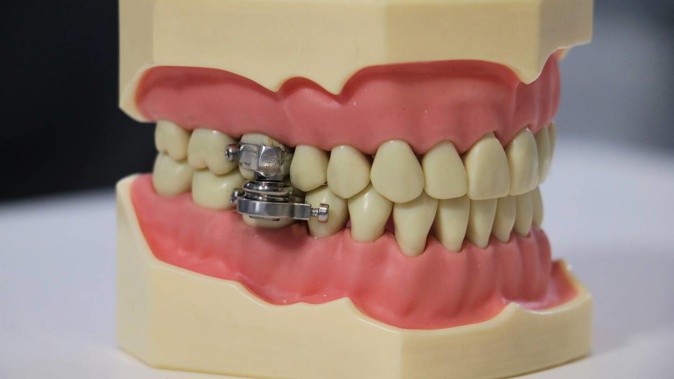
A new weight loss device which uses magnets to stop people opening their mouths enough to eat solids has been labelled "creepy and bizarre" by critics.
But Dunedin researchers who developed the device are defending the invention, saying those panning the weight loss tool have misunderstood its intention.
Otago University and United Kingdom researchers developed the world-first device, which uses magnets to lock the mouth almost shut, to help fight the global obesity epidemic.
DentalSlim Diet Control is an intra-oral device fitted by a dental professional to the upper and lower back teeth.
It used magnetic devices with unique custom-manufactured locking bolts.
The device was being widely ridiculed after being shared on social media, with Twitter users calling it "creepy" and "bizarre".
Lead researcher, University of Otago Health Sciences pro-vice-chancellor Prof Paul Brunton, said it was not intended to be used for general weight loss purposes, but instead for specific cases where there was a clinical need to lose weight quickly.
"Sometimes the first step [of losing weight] is quite difficult... so it was developed with a view of being an additional treatment that could be used in selected cases where it's appropriate."
Prof Paul Brunton said feedback from colleagues in the field had been positive.
The device allows the wearer to open their mouths only about 2mm, restricting them to a liquid diet, but it allows free speech and does not restrict breathing.
Participants in a Dunedin trial lost an average of 6.36kg in two weeks and were motivated to continue with their weight loss journey.
It would fitted by a dentist, and could be released by the user in case of an emergency and could be repeatedly fitted and removed.
"The main barrier for people for successful weight loss is compliance and this helps them establish new habits, allowing them to comply with a low-calorie diet for a period of time.
"It really kick-starts the process.
"It is a non-invasive, reversible, economical and attractive alternative to surgical procedures," Prof Brunton said.
The tool could be particularly helpful for those having to lose weight before they can undergo surgery, and for diabetes patients for whom weight loss could initiate remission, he said.
The practice of surgically wiring people's jaws shut became popular in the 1980s, but it came with risks; vomiting brought with it the risk of choking and after nine to 12 months the patients developed gum disease.
In some cases, there were continuing issues with restriction of jaw movement and some developed acute psychiatric conditions.
"Alternative strategies are required which may obviate surgery, or which reduce weight prior to surgery and so make it easier and safer.
"The beauty of it is that once patients are fitted with the device, after two or three weeks they can have the magnets disengaged.
"They could then have a period with a less restricted diet and then go back into treatment."
Patients given the device described it as tolerable, though the design has since been improved.
"This could actually help a lot of people."
The research team consisted of Prof Brunton, Dr Jithendra Ratnayake, Dr Peter Mei and Dr Arthi Veerasamy, all of Otago University, Dr Jonathan Bodansky, of Leeds, and Dr Richard Hall, of RMH Consultancy, Leeds.
The paper was published in the British Dental Journal.
Take your Radio, Podcasts and Music with you









